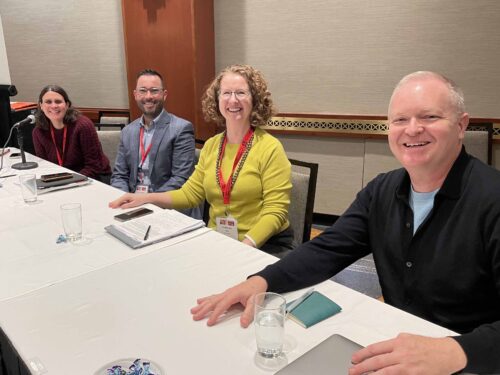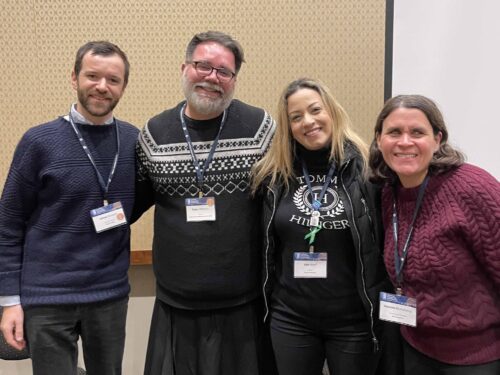Whether we’re supporting postsecondary faculty to teach with Wikipedia or guiding subject matter experts through learning how to contribute as editors themselves, collaborative relationships at both the institution and individual level are a cornerstone of Wiki Education’s work. Our programs center on bridging the gap between institutional expertise and the open knowledge movements of Wikipedia and Wikidata. And despite their shared goals, practitioners of institutional knowledge and practitioners of open knowledge often struggle to take that first step toward mutual understanding and collaboration. This is where we come in! Our impact depends on the strength of our partnerships, and those partnerships, in turn, help shape the scope of our work.
When it comes to partnership work, there’s no one size fits all approach. Partnerships can take many forms, serve a variety of purposes, and change over time. From attending or presenting at a conference, co-hosting a webinar, and fostering publishing opportunities, to amplifying a blog post, event opportunity, or social media feature, we work with our partners to reach communities in both online and in-person spaces.
Many of our partnerships begin with the aim to improve a specific subject-area on Wikipedia. Wikipedia’s gender gap is well-documented, and as a result, one of our earliest partners was the National Women Studies Association. In the decade since we began partnering with NWSA, more than 15,000 students have added over ten million words to Wikipedia in fields related to Women’s and Gender Studies. Wiki Education has presented at NWSA’s annual conference a number of times, where our faculty panelists have offered their unique perspectives on teaching with Wikipedia. But working with NWSA is not just about adding words to Wikipedia. As a result of our collective outreach efforts, hundreds of faculty have increased public awareness of critical research in their fields and thousands of students have learned the value of their public voice by participating in a Wikipedia assignment. From Anthropology to Sociology, we’ve experienced similar outreach success in other fields, all with the aim of bridging the more formalized institutions of knowledge production with those rooted in the open movement.

Sometimes our partnership work has taken on a broader scope. In 2016, we launched our Year of Science campaign to improve STEM content on Wikipedia.By engaging a wide range of science institutions with this initiative, we aimed not only to amplify critical scientific research, but to enhance the scientific literacy of STEM students in higher education. Like many of our partnerships and organizational initiatives, the work is ongoing. Though nearly a decade past the official Year of Science, we continue to promote cross-collaboration between STEM faculty, students and researchers through our Communicating Science work. As we approach the ten year anniversary of our Year of Science, Wiki Education hopes to both renew and broaden our work with STEM partners!
Partnerships often grow from a shared vision and a desire to make knowledge actionable. At Wiki Education, knowledge equity has long been a driving force of our work. Despite its millions of entries, English Wikipedia still contains significant content gaps, particularly in areas related to historically underrepresented peoples and subjects.
In 2024, we formally launched our knowledge equity initiative, and like the Year of Science, we began to engage and re-engage a network of like-minded partner organizations. Because no single field can take on knowledge equity alone, we’ve collaborated closely with a range of subject-matter experts and their students to help fill these gaps. Historians, philosophers, religionists, literary scholars, and area experts (to name a few) all offer different dimensions of these untold and under-told stories. In recent years, we’ve cohosted webinars with the American Historical Association, American Sociological Association, Linguistics Society of America, the American Academy of Religion, and H-Net, exchanged feature stories, exhibited and presented at a range of conferences, and expanded communication with both new and existing partners. While our knowledge equity initiative primarily focuses on collaborations with humanities-based partners, this work is relevant to all fields. With generous support from the Broadcom Foundation in recent years, we’ve also added dozens of new biographies of diverse figures in STEM to Wikipedia, furthering the goal of a more equitable and representative encyclopedia.

While much of our partnership work centers on the Wikipedia Student Program, through which Wiki Education helps postsecondary faculty explore the world of open pedagogy, our Scholars & Scientists Program offers subject matter experts the chance to engage in the open movement as a professional development opportunity. For faculty who want to share their expertise with a wider audience, Wikipedia is an obvious choice. It’s the world’s largest open and free encyclopedia, and is among the most visited websites globally. Through our Scholars & Scientists courses, we teach participants to contribute their knowledge to Wikipedia and Wikidata, ensuring their valuable knowledge is not hidden behind paywalls.
As with the student program, partnerships are the heart of this work. Academic associations, including the American Physical Society, the American Association for State and Local History, the Society of Family Planning, and the San Francisco Museum of Modern Art, have worked with Wiki Education to develop customized editing courses for their members. These partnerships allow organizations to offer their members innovative professional development opportunities to amplify their research expertise. Neither meant to supplant nor circumvent traditional modes of academic publishing, the contributions of these new Wikipedia editors continue to expand the reach and accessibility of knowledge for all.
Undoubtedly, at the heart of Wiki Education’s partnership work lies a spirit of exchange. Whether in the form of ideas, talent, expertise, programmatic offerings, communications or shared passion, our partnerships are built on mutual support and respect for the unique strengths each organization contributes. No partnership is quite the same, which brings a rich diversity to our work and our mission. Whether forged out of a desire to improve a particular subject’s coverage on Wikipedia, bring new pedagogical innovations to the classroom, expand publication opportunities, or out of simple curiosity, partners will remain a central part of our work at Wiki Education. We hope to strengthen and broaden our partnership work and welcome new opportunities to collaborate – we truly could not do this work alone! Connect with us at partnerships@wikiedu.org.
Interested in incorporating a Wikipedia assignment into your course? Visit teach.wikiedu.org to learn more about the free resources, digital tools, and staff support that Wiki Education offers to postsecondary instructors in the United States and Canada.
